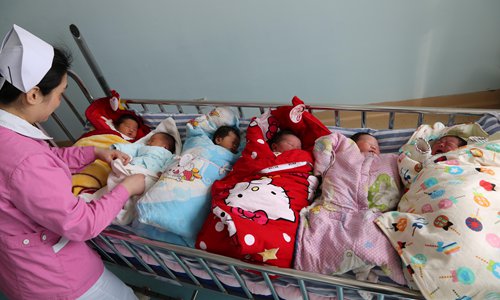Voices growing at two sessions to allow third child, protect rights of mothers
By Zhang Han Source:Global Times Published: 2020/5/21 17:03:40

A nurse attends to newborn babies at a hospital in Xiangyang, Hubei Province. Photo: VCG
Amid the continuously dropping birth rate and mounting pressure from an ageing society, Chinese legislators and political advisors have proposed allowing families to have a third child and called for better protection of economic rights for women who have children.
Zhu Lieyu, a lawyer from the Guoding Law Firm in Guangzhou, Guangdong Province, and also a deputy to the third session of the 13th National People's Congress (NPC), told the Global Times that one of his proposals called for families to be allowed a third child.
The impact of the second-child policy is receding as China in 2019 saw a birth rate of roughly 1.05 percent, the lowest since records began.
More than half of newborns in 2019 were second children, and these families should be allowed to have more children, which could offset the low number of first child births to a certain extent, Zhu said.
Considering the second-child policy's effects will not last long, it is an urgent matter to further ease family planning policies, Zhu said.
The dropping birth rate has brought about great social pressure, as China in 2019 saw its working population decrease by 890,000 people, the eighth consecutive year there has been a drop. Other problems connected to an ageing society are also emerging, such as pension shortfalls.
In addition to lifting the restriction, deputies also came up with proposals aimed at easing individual family's costs for childbirth and raising children in a bid to stimulate the birthrate.
The China Democratic League (CDL), one of China's eight non-Communist parties, has also brought proposals related to family planning to the Chinese People's Political Consultative Conference (CPPCC) National Committee.
The CDL proposal said that the low birthrate was caused by new perceptions of marriage and childbirth, with more people choosing to marry late or opting for DINK (double income, no kids) marriages. Chinese women have a high labor-force participation rate but their rights are insufficiently protected, while housing, education and medical costs also made people reluctant to have children.
The proposal suggested childbirth-related social welfare be family-affiliated rather than job-affiliated, so that a couple can share birth insurance and unemployed family members can also enjoy these benefits.
The proposal also asked for the building of a support system to ease the pressure on families raising children, which could include medical and education subsidies, as well as improving the nursery industry to ease the pressure on working parents.
As maternity leave tends to have a negative impact on a woman's career path, it is important to implement paternity leave and punish companies that violate women's employment rights, said the proposal, which also called for better guarantees of household registration and education rights for children born out of wedlock.
Posted in: SOCIETY